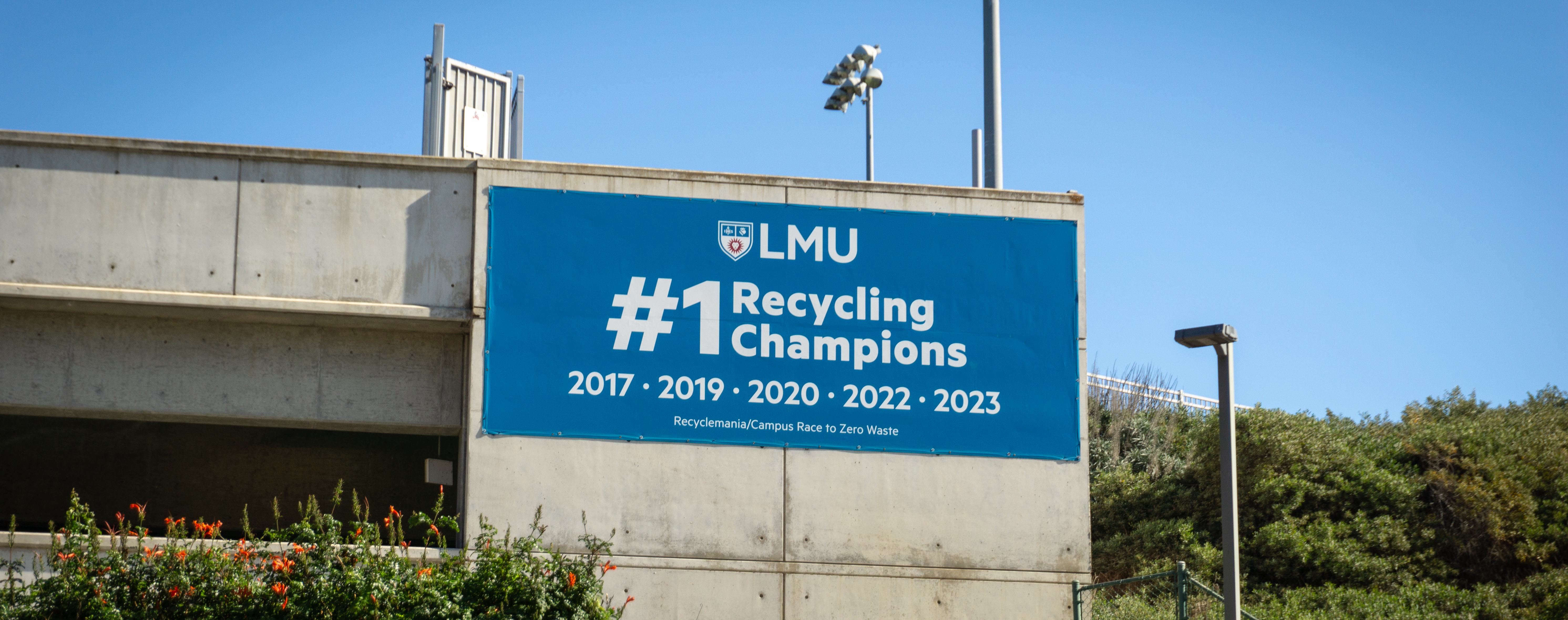Recycling

Why is it Important?
Recycling is a vital part of Loyola Marymount University's commitment to environmental stewardship, both locally and globally. Landfill waste emits harmful greenhouse gases such as carbon dioxide and methane, while plastic pollution threatens ecosystems, particularly our oceans — an estimated 14 million tons annually enters the oceans. Plastic waste not only endangers marine life through ingestion and entanglement but also breaks down into microplastics, which contaminate waterways, enter the food chain, and pose long-term risks to human and environmental health. Situated in Los Angeles, a region that produces tens of millions of tons of waste each year, LMU recognizes the urgent need for sustainable waste management. Through its robust recycling and composting programs, the university plays a key role in reducing waste, conserving resources, and preventing plastic and other pollutants from entering land and marine environments. By prioritizing waste diversion, LMU not only minimizes its environmental footprint but also contributes to broader regional efforts to fight pollution and protect natural ecosystems.
Recycling Team
LMU is a recognized leader in campus sustainability, with a long-standing commitment to reducing waste through robust recycling and composting programs. Since launching its comprehensive recycling program in 1990, LMU has received continuous recognition for its innovative waste diversion efforts. By reducing landfill waste—which emits harmful greenhouse gases like methane and carbon dioxide—and addressing the global threat of plastic pollution (up to 14 million tons annually entering oceans), LMU continues to set an example in environmental responsibility and innovation.
Key Milestones & Achievements
- First university in North America to achieve a 50% recycling diversion rate
- First higher education institution in California to implement campus-wide recycling
- Currently diverts about 72% of its solid waste, far exceeding national averages
- Earns consistent top honors in Campus Race to Zero Waste
Unique On-Campus Recycling Facility
- One of the first and few universities with an on-campus recycling center
- Staffed by a dedicated team that handles: sorting, bundling, pick-up and drop-off, donations, and secondary processing
Impact by the Numbers
- Historically recycles 13 lbs of corrugated cardboard and 15 lbs of paper per person per week
- Reduces greenhouse gas emissions by 664 metric tons of CO₂ annually
(equivalent to removing 130 cars from the road)
Environmental and Community Impact
- Reduces landfill waste, which emits harmful gases like methane and carbon dioxide
- Helps combat global plastic pollution (up to 14 million tons enter oceans annually)
- Partners with external organizations to collect and reuse items
Benefits of Recycling
- Resource Conservation: Recycling reduces the need for raw materials, conserving natural resources like timber, water, and minerals.
- Energy Savings: Recycling often uses less energy than producing new products from raw materials, leading to lower greenhouse gas emissions.
- Waste Reduction: Recycling minimizes the amount of waste sent to landfills, helping to prolong a material's lifespan.
- Economic Benefits: Recycling creates jobs in collection, processing, and manufacturing industries, boosting local economies.
- Environmental Protection: It helps protect ecosystems by reducing the need for extraction and processing of raw materials, which can cause habitat destruction and pollution.